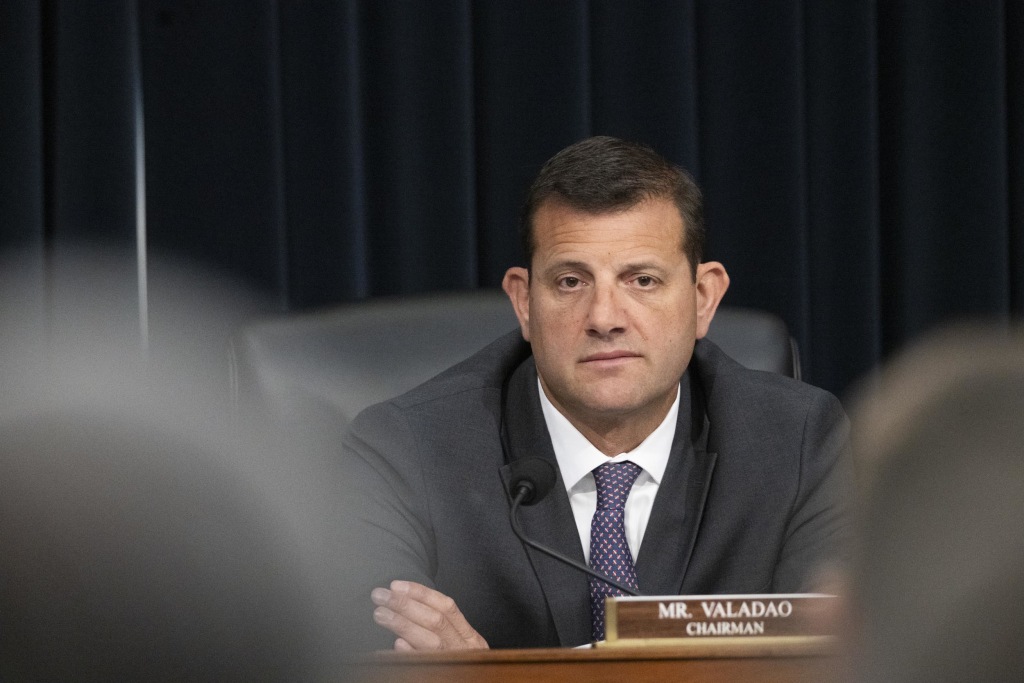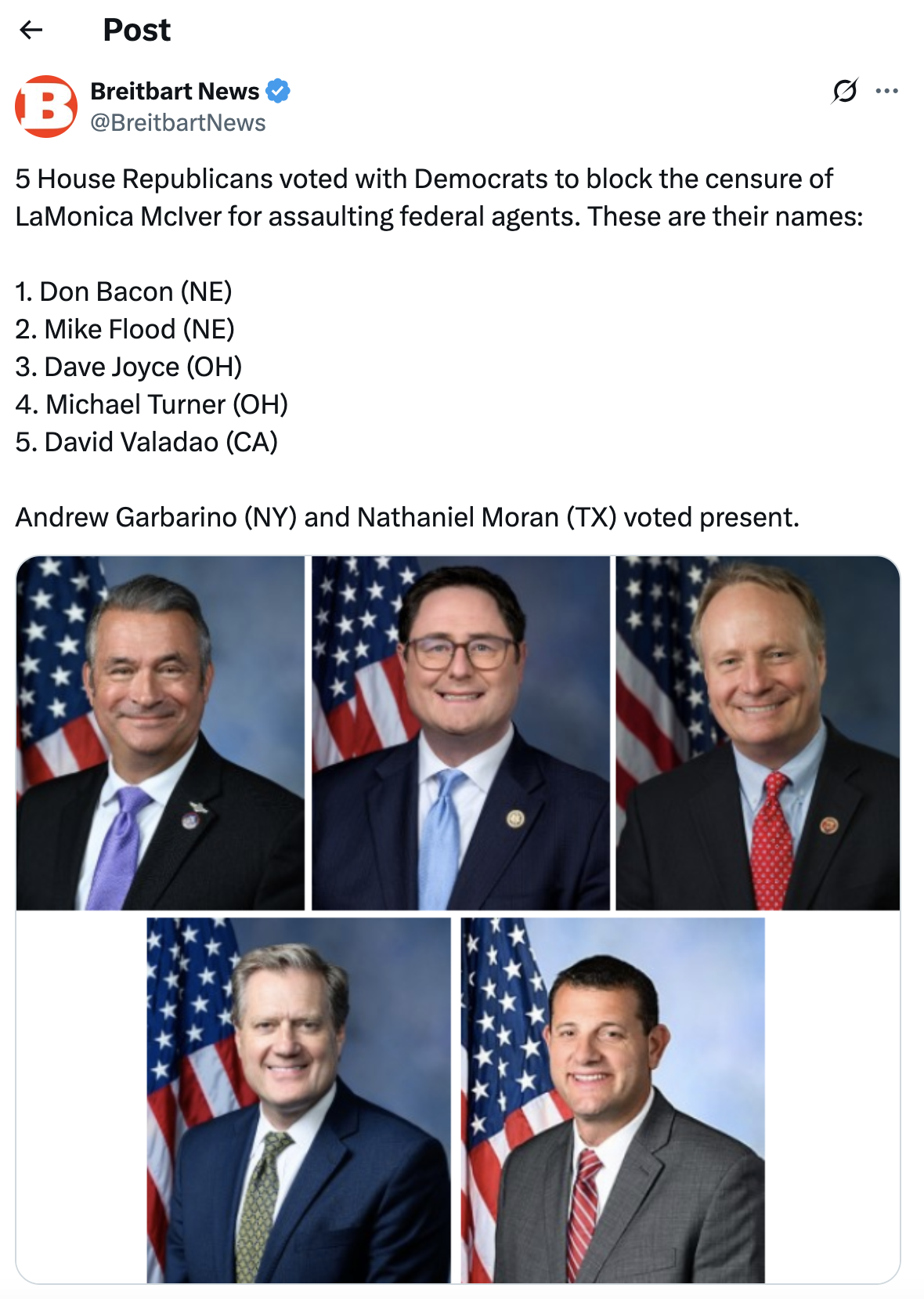
A dramatic moment unfolded in the U.S. House of Representatives this week when five Republicans sided with Democrats to kill a resolution aimed at censuring Rep. LaMonica McIver (D-NJ).
The resolution, which was introduced by Rep. Clay Higgins (R-LA), sought to reprimand McIver for her involvement in an altercation with Immigration and Customs Enforcement (ICE) officers earlier this year.
The vote, which ended in a 215-207 defeat for those advocating for McIver’s censure, has sparked fierce debate over loyalty, accountability, and the influence of political motives in the legislative process.
McIver, a freshman congresswoman, has been at the center of controversy since April, when she allegedly clashed with ICE officers during a protest outside a detention facility in Newark, New Jersey.
The altercation took place during an oversight visit to Delany Hall, a privately operated detention center. McIver and her colleagues were reportedly denied access to the facility, and tensions escalated when federal officers attempted to arrest Newark Mayor Ras Baraka.
Prosecutors allege that McIver elbowed an officer during the confrontation, leading to her being charged with assaulting law enforcement. McIver, however, maintains that she was the one who was assaulted and that the charges and censure motion are politically motivated.
The motion to censure McIver was pushed by Rep. Higgins, who has been an outspoken critic of the Democratic Party's stance on law enforcement and immigration.
The resolution argued that McIver’s actions during the protest—especially her role in the altercation with ICE officers—disqualified her from serving on the Homeland Security Committee, where she holds a position of oversight authority over ICE.

The resolution highlighted the “significant conflict of interest” McIver’s position on the committee presented, given her involvement in the dispute.
Higgins, using a legal mechanism to bypass GOP leadership and force a vote, managed to bring the censure measure to the floor. However, the outcome of the vote was not what he or many Republicans had hoped for.
A surprising number of Republican lawmakers broke ranks with their party and voted against the motion, ultimately allowing the resolution to fail.
The final tally showed that 215 members voted to block the censure, while 207 voted in favor, with a handful of Republicans voting "present" during the proceedings.
The fact that five Republicans crossed party lines to side with Democrats on such a contentious issue has raised eyebrows and caused significant consternation within the GOP.
Among the Republicans who voted against the censure, two notably voted “present,” a tactic often used to avoid taking a firm stance on a controversial issue.
The incident and the subsequent vote have set off a firestorm of controversy within both political parties. McIver, after the vote, responded defiantly, calling out the Republicans who had supported her and vowing that she would not be intimidated by the party's critics.
“If House Republicans think they can make me run scared, they’re wrong,” McIver said in a statement following the vote. “We were all elected to do the people’s work,” she added. “Clay Higgins clearly does not.”

McIver’s remarks reflected her belief that the censure motion was part of a broader political strategy to undermine her position and discredit her actions. She insisted that the charges against her were politically motivated, a sentiment echoed by some of her Democratic allies.
According to McIver and her supporters, the Republican push for censure is a distraction from the broader issues of immigration reform and law enforcement oversight, areas in which McIver has positioned herself as a vocal advocate for change.
The decision by five Republicans to vote against the censure measure is likely to have far-reaching political consequences. The votes have fueled accusations of betrayal and political weakness within the GOP.
Many Republicans, particularly those on the more conservative and populist wings of the party, have expressed outrage over the votes, viewing them as a failure to hold a Democratic lawmaker accountable for what they perceive as an egregious violation of law enforcement norms.
Some political analysts have speculated that the five Republicans who sided with Democrats on this issue may face significant consequences in the upcoming midterms.
As the party moves further toward the right, particularly under the influence of the MAGA movement, these Republicans may find themselves vulnerable to primary challengers who argue that they have failed to uphold conservative principles.
It is possible that these lawmakers could face challenges from more conservative candidates in 2026, potentially risking their seats to a stronger Republican opponent in a primary contest.
The rise of primary challenges from more ideologically driven candidates is becoming a recurring theme within the Republican Party. The increasing influence of the populist wing of the GOP has made it more difficult for establishment figures to maintain control of the party’s direction.

This move by five Republicans to break with their party on the censure vote could provide ammunition for MAGA-aligned challengers, who could use the vote as a rallying cry to accuse these Republicans of being too willing to compromise with Democrats.
One prominent political analyst pointed out that the GOP could face serious risks if members who break ranks with party leadership remain in positions of power. "This could very well lead to a cleansing of weak members of the GOP,” the analyst said.
“If this continues, the Republican Party could find itself in a position where it is further defined by its base’s demands and less by its traditional institutional strength.”
However, despite the division caused by the vote, there are others who believe that these breakaway Republicans are simply following their principles and that their votes are indicative of a larger desire for political independence.
In fact, some observers argue that the votes represent a rejection of partisan grandstanding in favor of a more nuanced, bipartisan approach to governance.
These Republicans might view the censure measure as an overreach, particularly given the complex nature of the incident involving McIver and the lack of definitive evidence that would warrant such a drastic action.
For now, the question of how this issue will affect the GOP’s chances in the midterms remains unclear. Some believe the votes will embolden Democrats, who may use the GOP division to further their narrative of Republican infighting.
Others believe the controversy will simply serve to strengthen the resolve of more conservative voters, rallying them against what they perceive as the establishment wing of the party.

The political stakes of this vote cannot be understated. With control of the House of Representatives in play in the 2026 midterms, every vote counts.
The censure motion may seem like a small matter in the grand scheme of American politics, but the underlying divisions it has exposed within the Republican Party are much larger and more consequential.
In the meantime, McIver’s legal situation continues to unfold. The Justice Department is pursuing charges against her for allegedly assaulting law enforcement officers, and she remains defiant in the face of these allegations.
The outcome of her case will likely continue to influence the political dynamics surrounding her and the broader debates over law enforcement accountability and political accountability in Congress.
What remains clear is that the censure vote and its aftermath have further highlighted the growing tensions within the Republican Party, and possibly between Republicans and Democrats, over issues of law enforcement, political accountability, and the role of the government in overseeing controversial issues.

The consequences of this vote will continue to ripple through the political landscape, shaping the direction of both the GOP and its relationship with the American public in the years to come.
-1750570385-q80.webp)


